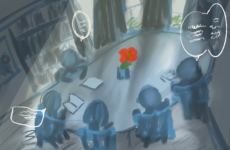
Graphic courtesy of Yujin Kim ’23
Many people are amused when I tell them that I speak English, Cantonese, and Mandarin. I grew up in Hong Kong, where the local language is Cantonese, a dialect of Chinese. I was exposed to English and Mandarin at a young age, as they are often used to cater to the large and diverse immigrant population in Hong Kong.
When I went to a local elementary school, my classmates and I spoke Cantonese, and I avoided speaking English outside of the classroom altogether. While I was there, a much heavier emphasis was placed on the Chinese curriculum, so my English classes lacked rigor and were based on grammar rather than practical usage.
Then, I switched to an international middle school, where white expats who spoke perfect English were put on a pedestal. Our idealization of English stemmed from our exposure to American and British books and movies from a young age. I wanted to sound American, and I looked down on people who spoke accented English.
I began to intentionally taint my Cantonese with slurring and awkward pronunciation, attempting to sound American. I rarely spoke Cantonese at home anymore and took for granted the fact that my entire family spoke English. At my international school, I was required to speak Mandarin instead of Cantonese in Chinese class. The two dialects are drastically different in structure and pronunciation, with the former having four tones and the latter, nine, causing me to mix them up often. Soon, Mandarin and Cantonese had become a blurred afterthought, while English became my primary language.
Coming to Choate, I was confronted with its multilingual and multicultural environment. Choate has a large Mandarin-speaking community consisting of Chinese Americans, international students, and a wide spectrum of Chinese learners. I chatted to dormmates and gossiped with friends in Mandarin. I had never used Mandarin so frequently before, and it never occurred to me that this would happen somewhere like Wallingford, Connecticut.
Using Mandarin with my Chinese friends makes me feel connected to them and my culture. Speaking in a different language brings out a different side of people, and I love seeing my friends light up and rave about 湯圓 (tangyuan: sweet glutinous rice balls) or the song “童話” by Michael Wong. I love moments when I finally understand an inexpressible thought in English that is easily articulated in Chinese. I love playing mahjong and hearing the excited shouts of “糊了!” when someone wins a game. However, not having spoken much Mandarin outside of Chinese class, I’d get confused by slang and cultural references or get lost mid-sentence when my friends speak rapid-fire Mandarin.
My English can come across as an ambiguous mix of American, British, and Cantonese accents, since I have always been surrounded by a wide range of English accents. I say “pass-ta” instead of “pah-sta.” I articulate my consonants, so I say “LaTin” instead of “La-in” or “Ladin.” Consequently, my teachers and classmates make assumptions about how I speak English because of my multilingual background. In these moments where my accented English, awkward Cantonese, and inadequate Mandarin shine through, I question if I am truly fluent in any of the languages I speak.
However, I’ve realized that how I use language reflects how my life experiences have shaped who I am and how I communicate with the world. So, I have learned to embrace the quirks in my speech. Before I left for the U.S., my grandma reminded me solemnly,“你唔好唔記得晒你啲廣東話,” or “Don’t forget all your Cantonese.” Cantonese is my mother tongue and speaking it reminds me of home. I make the effort to speak Cantonese to my family when I call them, and I stop myself when I default to English. At school, I speak Mandarin to Mandarin-speaking friends when possible to practice it. One language used to diminish the others. Now, they work in tandem to serve different purposes in my life and showcase different facets of my identity.




